Purchasing a rental home, duplex or other rental property can be a valuable investment, but a difficult relationship with your tenants can complicate things. What happens if they don’t care for your property? What if they move in a relative that you would not have approved as a tenant? Thankfully, you can prevent many conflicts through a carefully-written lease agreement. In addition to basic details like your property’s address, the duration of the lease and information about rent payments, other terms can help you protect your investment.
Make sure that you include the legal names of your tenants—all of them.
Even if one person will be paying the rent, it is important that your lease contract lists the legal names of every adult that will live on your property. Having their signatures on a legal document helps you protect yourself if any of the occupants don’t uphold their responsibilities or properly maintain the property.
This may also include terms for subleasing.
If your tenants sublease your property without informing you, you may be left knowing nothing about the people in your property. By detailing a formal process for a sublease, you can penalize tenants who do not go through the correct process and detail any expected subleasing fees. You can also establish your expectations for screening processes for subleasing tenants so that you always know who lives on your property.
Detail the maintenance that you expect.
While some wear and tear on a property is to be expected, how much maintenance do you expect your tenants to do on the property? Are there any tasks that you will take care of as the landlord? How clean should the property be when they move out? Lay out your expectations as clearly as possible so that there are no questions when an issue arises.
Include any relevant details about the security deposit.
A security deposit may help you address any damage done by the tenants, but it could also become a source of conflict if you and your tenant disagree about the terms. Laying out the amount of the deposit, the date it was paid and the terms under which it will be returned in your lease agreement can protect you if issues arise during the lease.
For many landlords, having an experienced real estate attorney review their lease agreement can help them protect their property and their investment throughout the lease.




